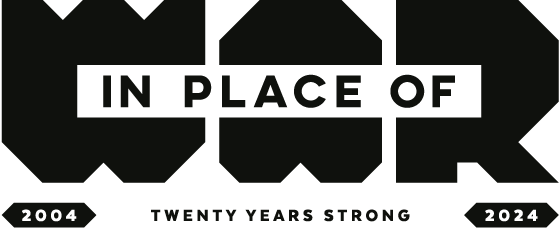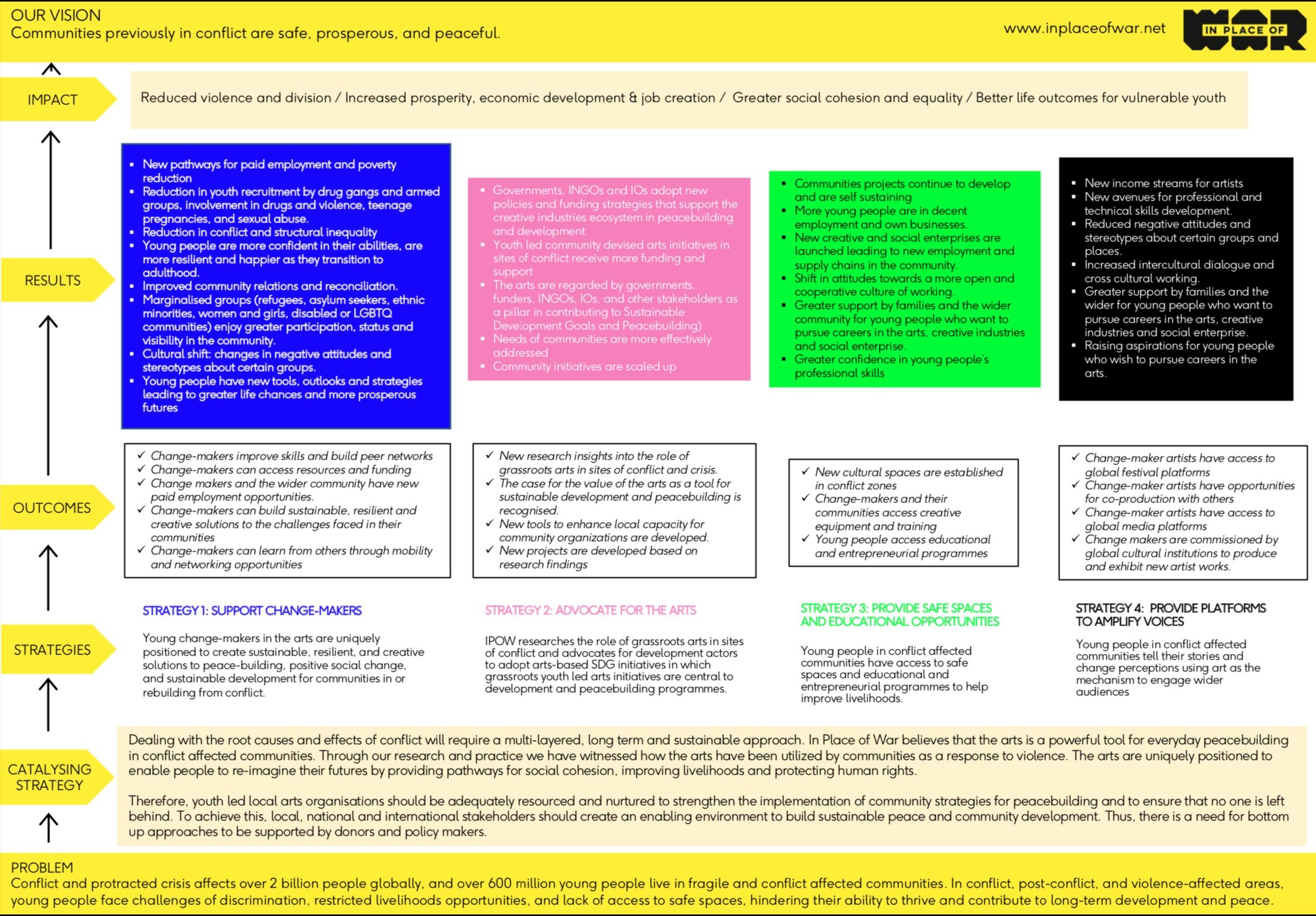Theory of change
Problem
Conflict and protracted crisis affects over 2 billion people globally, and over 600 million young people live in fragile and conflict affected communities. In conflict, post-conflict, and violence-affected areas, young people face challenges of discrimination, restricted livelihoods opportunities, and lack of access to safe spaces, hindering their ability to thrive and contribute to long-term development and peace.
Catalysing Strategy
Dealing with the root causes and effects of conflict will require a multi-layered, long term and sustainable approach. In Place of War believes that the arts is a powerful tool for everyday peacebuilding
in conflict affected communities. Through our research and practice we have witnessed how the arts have been utilized by communities as a response to violence. The arts are uniquely positioned to
enable people to re-imagine their futures by providing pathways for social cohesion, improving livelihoods and protecting human rights.
Therefore, youth led local arts organisations should be adequately resourced and nurtured to strengthen the implementation of community strategies for peacebuilding and to ensure that no one is left
behind. To achieve this, local, national and international stakeholders should create an enabling environment to build sustainable peace and community development. Thus, there is a need for bottom
up approaches to be supported by donors and policy makers.
Strategies
STRATEGY 1: SUPPORT CHANGE-MAKERS
Young change-makers in the arts are uniquely positioned to create sustainable, resilient, and creative solutions to peace-building, positive social change, and sustainable development for communities in or rebuilding from conflict.
STRATEGY 2: ADVOCATE FOR THE ARTS
IPOW researches the role of grassroots arts in sites of conflict and advocates for development actors to adopt arts-based SDG initiatives in which grassroots youth led arts initiatives are central to development and peacebuilding programmes.
STRATEGY 3: PROVIDE SAFE SPACES AND EDUCATIONAL OPPORTUNITIES
Young people in conflict affected communities have access to safe spaces and educational and entrepreneurial programmes to help improve livelihoods.
STRATEGY 4: PROVIDE PLATFORMS TO AMPLIFY VOICES
Young people in conflict affected communities tell their stories and change perceptions using art as the mechanism to engage wider audiences.
Outcomes
STRATEGY 1: SUPPORT CHANGE-MAKERS
- Change-makers improve skills and build peer networks
- Change-makers can access resources and funding
- Change-makers and the wider community have new paid employment opportunities
- Change-makers can build sustainable, resilient and creative solutions to the challenges faced in their communities
- Change-makers can learn from others through mobility and networking opportunities
STRATEGY 2: ADVOCATE FOR THE ARTS
- New research insights into the role of grassroots arts in sites of conflict and crisis
- The case for the value of the arts as a tool for sustainable development and peacebuilding is recognised
- New tools to enhance local capacity for community organizations are developed
- New projects are developed based on research findings
STRATEGY 3: PROVIDE SAFE SPACES AND EDUCATIONAL OPPORTUNITIES
- New cultural spaces are established in conflict zones
- Change-makers and their communities access creative equipment and training
- Young people access educational and entrepreneurial programmes
STRATEGY 4: PROVIDE PLATFORMS TO AMPLIFY VOICES
- Change-maker artists have access to global festival platforms
- Change-maker artists have opportunities for co-production with others
- Change-maker artists have access to global media platforms
- Change makers are commissioned by global cultural institutions to produce and exhibit new artist works
Results
STRATEGY 1: SUPPORT CHANGE-MAKERS
- New pathways for paid employment and poverty reduction
- Reduction in youth recruitment by drug gangs and armed groups, involvement in drugs and violence, teenage pregnancies, and sexual abuse
- Reduction in conflict and structural inequality
- Young people are more confident in their abilities, are more resilient and happier as they transition to adulthood
- Improved community relations and reconciliation
- Marginalised groups (refugees, asylum seekers, ethnic minorities, women and girls, disabled or LGBTQ communities) enjoy greater participation, status and visibility in the community
- Cultural shift: changes in negative attitudes and stereotypes about certain groups
- Young people have new tools, outlooks and strategies leading to greater life chances and more prosperous futures
STRATEGY 2: ADVOCATE FOR THE ARTS
- Governments, INGOs and IOs adopt new policies and funding strategies that support the creative industries ecosystem in peacebuilding and development
- Youth led community devised arts initiatives in sites of conflict receive more funding and support
- The arts are regarded by governments, funders, INGOs, IOs, and other stakeholders as a pillar in contributing to Sustainable Development Goals and Peacebuilding)
- Needs of communities are more effectively addressed
- Community initiatives are scaled up
STRATEGY 3: PROVIDE SAFE SPACES AND EDUCATIONAL OPPORTUNITIES
- Communities projects continue to develop and are self sustaining
- More young people are in decent employment and own businesses
- New creative and social enterprises are launched leading to new employment and supply chains in the community
- Shift in attitudes towards a more open and cooperative culture of working
- Greater support by families and the wider community for young people who want to pursue careers in the arts, creative industries and social enterprise
- Greater confidence in young people’s professional skills
STRATEGY 4: PROVIDE PLATFORMS TO AMPLIFY VOICES
- New income streams for artists
- New avenues for professional and technical skills development
- Reduced negative attitudes and stereotypes about certain groups and places
- Increased intercultural dialogue and cross cultural working
- Greater support by families and the wider for young people who want to pursue careers in the arts, creative industries and social enterprise
- Raising aspirations for young people who wish to pursue careers in the arts
Impact
Reduced violence and division / Increased prosperity, economic development & job creation / Greater social cohesion and equality / Better life outcomes for vulnerable youth.
Our Vision
Communities previously in conflict are safe, prosperous, and peaceful.


